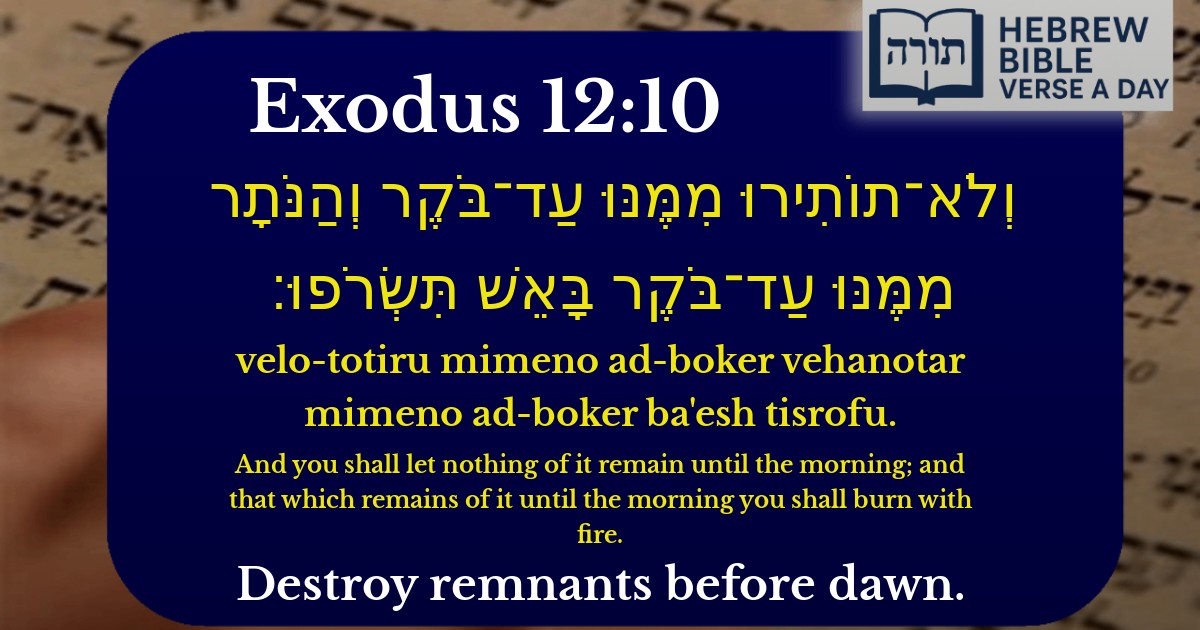Join Our Newsletter To Be Informed When New Videos Are Posted
Join the thousands of fellow Studends who rely on our videos to learn how to read the bible in Hebrew for free!
Hebrew Text
וְלֹא־תוֹתִירוּ מִמֶּנּוּ עַד־בֹּקֶר וְהַנֹּתָר מִמֶּנּוּ עַד־בֹּקֶר בָּאֵשׁ תִּשְׂרֹפוּ׃
English Translation
And you shall let nothing of it remain until the morning; and that which remains of it until the morning you shall burn with fire.
Transliteration
Velo-totiru mimeno ad-boker vehanotar mimeno ad-boker ba'esh tisrofu.
Hebrew Leining Text
וְלֹא־תוֹתִ֥ירוּ מִמֶּ֖נּוּ עַד־בֹּ֑קֶר וְהַנֹּתָ֥ר מִמֶּ֛נּוּ עַד־בֹּ֖קֶר בָּאֵ֥שׁ תִּשְׂרֹֽפוּ׃
וְלֹא־תוֹתִ֥ירוּ מִמֶּ֖נּוּ עַד־בֹּ֑קֶר וְהַנֹּתָ֥ר מִמֶּ֛נּוּ עַד־בֹּ֖קֶר בָּאֵ֥שׁ תִּשְׂרֹֽפוּ׃
🎵 Listen to leining
Parasha Commentary
📚 Talmud Citations
This verse is quoted in the Talmud.
📖 Pesachim 21b
The verse is discussed in the context of the laws regarding the Passover sacrifice, specifically the prohibition of leaving any of it until morning and the requirement to burn the remains.
📖 Yoma 49a
The verse is referenced in a discussion about the proper disposal of sacrificial remains, emphasizing the importance of burning what is left over.


Context of the Verse
The verse (Shemot 12:10) appears in the context of the laws of the Korban Pesach (Paschal sacrifice), given to Bnei Yisrael before their exodus from Egypt. It instructs that no part of the sacrifice should remain until morning, and any leftovers must be burned.
Rashi's Explanation
Rashi explains that the prohibition against leaving the Korban Pesach until morning serves two purposes:
Rambam's Halachic Perspective
In Hilchot Korban Pesach (1:8), the Rambam codifies this law, emphasizing that burning the leftovers is a positive commandment. He further rules that this applies not only to the meat but also to any bones or sinews that retain flavor (Pesachim 84b).
Midrashic Insight
The Mechilta connects this verse to the broader theme of zerizut (alacrity) in mitzvot. Just as Bnei Yisrael were commanded to eat the Korban Pesach with haste, we learn the importance of performing mitzvot promptly and without procrastination.
Kabbalistic Interpretation
The Zohar teaches that burning the leftovers symbolizes the eradication of spiritual "leftovers"—negative influences or traces of impurity that must be purged before redemption can be complete.
Practical Halachic Implications